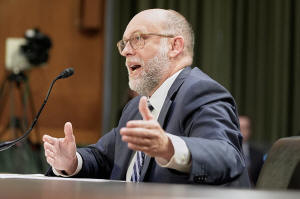Some education grants in limbo were used for ‘leftwing agenda,’ Trump
administration says
[July 03, 2025]
By BIANCA VÁZQUEZ TONESS
The Trump administration has accused states and schools of using federal
education grants earmarked for immigrants’ children and low-income
students to help fund “a radical leftwing agenda.”
The administration this week withheld more than $6 billion intended for
after-school and summer programs, English language instruction, adult
literacy and more, saying it would review the grants to ensure they
align with President Donald Trump’s priorities. The freeze sent schools
and summer camp providers scrambling to determine whether they can still
provide programs like day camps this summer or after-hours child care
this fall.
On Wednesday, the Office of Management and Budget said an initial review
showed schools used some of the money to support immigrants in the
country illegally or promote LGBTQ+ inclusion. The administration said
it hadn't made any final decisions about whether to withhold or release
individual grants.
“Many of these grant programs have been grossly misused to subsidize a
radical leftwing agenda,” the Office of Management and Budget said in a
statement.
It said New York schools had used money for English language instruction
to promote organizations that advocate for immigrants in the country
illegally. Washington state used the money to direct immigrants without
legal status toward scholarships the Trump administration says were
“intended for American students.” Grant funds also were used for a
seminar on “queer resistance in the arts,” the office said.
Officials from New York and Washington state didn't immediately respond
to requests for comment.

Advocates for low-income and immigrant children connected the grant
freeze to the Trump administration's larger crackdown on immigrants. Two
of the federal programs put on hold were appropriated by Congress to
help support English proficiency of students still learning the language
and migrant children who move with their parents to follow agricultural
and other jobs.
School districts use the $890 million earmarked for English learners in
a wide range of purposes, from training teachers' aides who work with
English learners, to running summer schools designed for them, to hiring
family liaisons who speak the parents’ native languages. The $375
million appropriated for migrant education is often used to hire
dedicated teachers to travel close to where students live.
[to top of second column]
|

Office of Management and Budget director Russell Vought testifies
during a Senate Appropriations Committee hearing on the rescissions
package on Capitol Hill, Wednesday, June 25, 2025, in Washington.
(AP Photo/Mariam Zuhaib)

By “cherrypicking extreme examples,” the administration is seeking
to conflate all students learning English with people who are in the
country illegally, said Amaya Garcia, who directs education research
at New America, a left-leaning think tank in Washington, D.C.
In reality, the majority of English learners in public schools were
born in the United States, according to data from the Migration
Policy Institute.
“The way they’re framing it is that we’re using this money for
undocumented students and families," said Margarita Machado-Casas,
president of the National Association of Bilingual Educators. "It’s
a distraction. A distraction from what’s actually happening: that
5.3 million English learners who speak lots of different languages,
not just Spanish, will suffer.”
Even if the students lack legal status, states may not deny public
education to children in the country illegally under a 1982 Supreme
Court decision known as Plyler v. Doe. Conservative politicians in
states such as Oklahoma, Texas and Tennessee have pursued policies
that question whether immigrants without legal residency should have
the right to a public education, raising the possibility of
challenges to that landmark ruling.
Meanwhile, states and school districts are still trying to
understand what it will mean for their students and their staff if
these funds never arrive.
In Oregon, eliminating grants for English learners and migrant
students would "undermine the state’s efforts to increase academic
outcomes for multilingual students, promote multilingualism, close
opportunity gaps and provide targeted support to mobile and
vulnerable student groups,” said Liz Merah, spokeswoman for the
state's Department of Education.
____
Associated Press writer Collin Binkley contributed from Washington.
All contents © copyright 2025 Associated Press. All rights reserved |